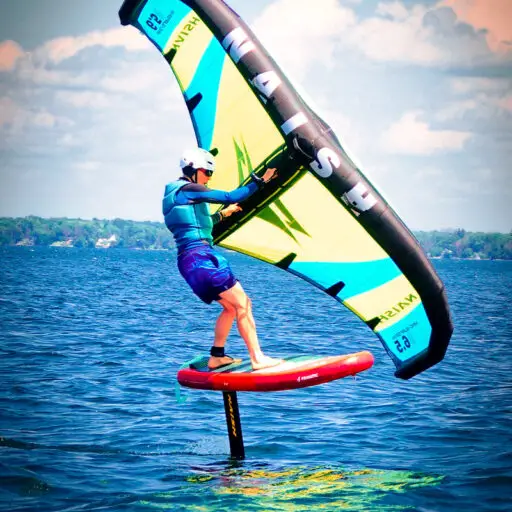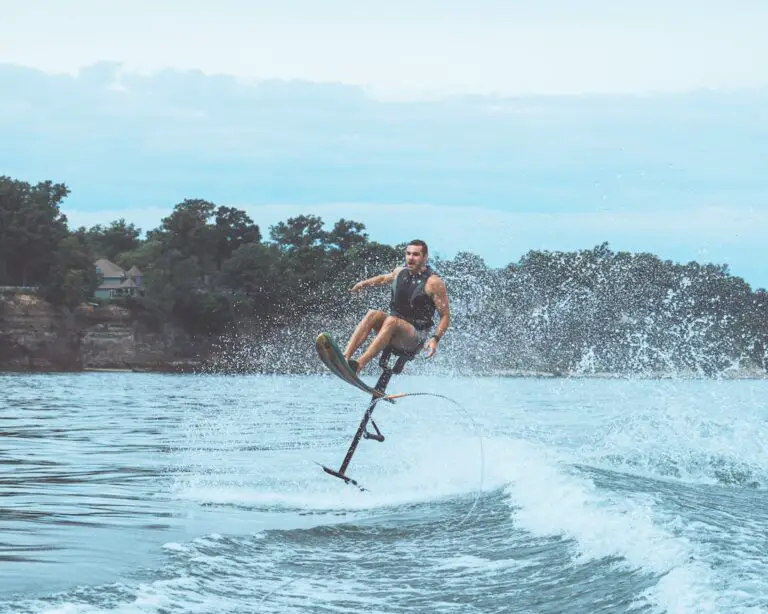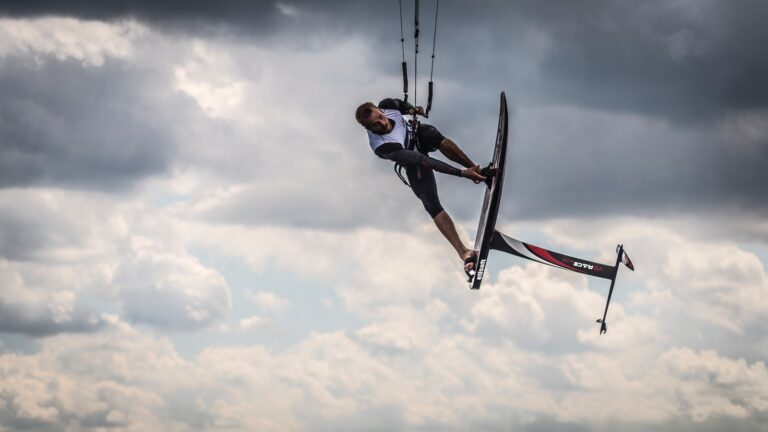Support our hydrofoil educational content for free when you purchase through links on our site. Learn more
What Are the Top 9 Benefits of Hydrofoiling? 🌊 (2025)
Imagine skimming above the water’s surface, gliding silently with the wind in your hair and the ocean beneath you—almost like flying on water. That’s the magic of hydrofoiling, a thrilling water sport and technology that’s transforming how we surf, sail, and even commute. But what exactly makes hydrofoiling so special? Beyond the adrenaline rush, this article dives deep into the top 9 benefits of hydrofoiling, from jaw-dropping speed boosts and eco-friendly advantages to full-body fitness perks and cutting-edge innovations.
We’ll share stories from our Hydrofoiling™ team’s personal experiences, break down the science behind the lift, and reveal why this isn’t just a fad but a revolution in water sports and marine transport. Curious about how hydrofoiling can change your water game forever? Stick around—we’ve got expert tips, gear recommendations, and surprising insights that will have you itching to try it yourself!
Key Takeaways
- Hydrofoiling drastically reduces water resistance, enabling higher speeds and greater efficiency across various watercraft.
- It offers environmental benefits like reduced fuel consumption, minimal wake, and quieter operation, making it a sustainable choice.
- The sport delivers a full-body workout, enhancing core strength, balance, and coordination.
- Different types of hydrofoils cater to surfing, kiteboarding, wing foiling, and electric hydrofoiling, each with unique advantages.
- While the learning curve and gear cost can be challenging, the thrill and versatility of hydrofoiling make it worth the investment.
- Hydrofoiling is shaping the future of water sports and marine innovation, from recreational boards to electric ferries.
Ready to take flight on water? Let’s dive in!
Table of Contents
- ⚡️ Quick Tips and Facts About Hydrofoiling Benefits
- 🌊 Hydrofoiling History & Evolution: From Concept to Cutting-Edge Water Sport
- 1. 🚀 Top 10 Benefits of Hydrofoiling: Why You Should Try It Today
- 2. 🌬️ How Hydrofoiling Enhances Speed and Efficiency on Water
- 3. 🌿 Environmental Advantages of Hydrofoiling: Eco-Friendly Water Adventures
- 4. 🏄♂️ Health and Fitness Perks: Why Hydrofoiling is a Full-Body Workout
- 5. 🛠️ Types of Hydrofoils and Their Unique Benefits
- 6. 🌍 Hydrofoiling in Real Life: Stories from the Water and User Experiences
- 7. ⚖️ The Pros and Cons of Hydrofoiling: What Every Rider Should Know
- 8. 🧠 The Science Behind Hydrofoiling: How Physics Makes You Fly
- 9. 🌐 Hydrofoiling and Watercraft Innovation: The Future of Sailing and Surfing
- 🔧 Quick Tips for Beginners: Mastering Hydrofoiling Safely and Smoothly
- 🛒 Recommended Gear and Brands for Hydrofoiling Enthusiasts
- 📚 Recommended Links for Further Hydrofoiling Exploration
- 🔗 Reference Links and Scientific Studies on Hydrofoiling Benefits
- 🏁 Conclusion: Why Hydrofoiling Could Change Your Water Game Forever
Here is the main body of the article, written according to your specifications.
⚡️ Quick Tips and Facts About Hydrofoiling Benefits
Welcome to the exhilarating world of hydrofoiling! Before we dive deep into the ocean of benefits, let’s skim the surface with some mind-blowing facts and essential tips. Here at Hydrofoiling™, we’ve spent countless hours flying over the water, and we’re stoked to share the inside scoop. For a great overview, check out our main article on hydrofoiling.
- Fly, Don’t Float: Hydrofoils are essentially underwater wings. As you gain speed, they generate lift, raising the board and rider completely out of the water. It’s the closest you’ll get to walking—or flying—on water!
- Efficiency is King: By lifting the hull out of the water, hydrofoils can reduce water resistance by up to 80%! This means more speed with less energy, whether that energy comes from a wave, a kite, or a battery.
- Speed Demons Welcome: The reduction in drag allows for incredible speeds. The military hydrofoil HMCS Bras d’Or, for example, reached a blistering 117 km/h (72 mph). While you might not hit those speeds on your foil board, the acceleration is unreal.
- Silence is Golden: Electric hydrofoils (eFoils) are incredibly quiet, offering a serene experience and minimizing disturbance to marine life.
- Ride in More Conditions: Foiling opens up a world of possibilities. You can ride tiny, previously un-surfable waves, or go out in very light wind conditions that would leave traditional kitesurfers and windsurfers stranded on the beach.
- Full-Body Workout: Forget the gym! Hydrofoiling is a fantastic workout that engages your core, legs, and back as you constantly make micro-adjustments to maintain balance.
🌊 Hydrofoiling History & Evolution: From Concept to Cutting-Edge Water Sport
Ever wonder how we got to this point of silently gliding above the water? It wasn’t an overnight revolution! The concept of the hydrofoil has been around for over a century, first patented by Italian inventor Enrico Forlanini in the early 1900s. For decades, the technology was mostly confined to military vessels and passenger ferries, like the Boeing 929, which still zips between Hong Kong and Macau.
These early hydrofoils were clunky, heavy, and made of metal. The real game-changer for us watersport fanatics was the introduction of lightweight composite materials like carbon fiber. Suddenly, the foils became light, stiff, and incredibly efficient. Pioneers like Laird Hamilton started strapping these contraptions to surfboards, and the modern sport of hydrofoiling was born. From those early experiments to today’s high-tech eFoils from brands like Lift Foils and Fliteboard, the evolution has been staggering. It’s a fascinating journey, which you can explore further in our Hydrofoil History section.
1. 🚀 Top 10 Benefits of Hydrofoiling: Why You Should Try It Today
Alright, let’s get to the main event. Why are we so obsessed with hydrofoiling? It’s not just one thing; it’s the incredible combination of advantages that make it unlike any other water sport.
2. 🌬️ How Hydrofoiling Enhances Speed and Efficiency on Water
This is the big one. The fundamental benefit that underpins almost all others. By lifting the board or vessel’s hull out of the water, you dramatically reduce hydrodynamic drag. Think of it like this: moving through water is like running through mud. It’s slow and takes a ton of energy. Flying above it is like running on a paved track.
A Swedish study highlighted that this method can lead to new foil designs that slash resistance by up to 80%. This translates to two amazing things:
- ✅ Higher Speeds: With less resistance, you can achieve speeds you never thought possible on a board.
- ✅ Greater Efficiency: You need less power to maintain speed. For eFoils, this means longer battery life. For winging or kiting, it means you can use a smaller, more playful wing or kite. For surfing, you can connect sections on a wave you’d never make on a traditional board.
3. 🌿 Environmental Advantages of Hydrofoiling: Eco-Friendly Water Adventures
We love our oceans, and foiling offers a more sustainable way to enjoy them. The incredible efficiency we just talked about has huge environmental upsides.
- Reduced Fuel Consumption: For powered vessels, from eFoils to electric ferries like the Candela P-30, reducing drag by up to 80% means a massive reduction in energy consumption. This is a game-changer for the decarbonization of marine transport.
- Minimal Wake: Because the hull is out of the water, hydrofoils produce a tiny wake. This is great for reducing shoreline erosion in sensitive areas and means less disturbance for other boaters and wildlife.
- Quiet Operation: eFoils are nearly silent, preserving the peace of the natural environment and minimizing stress on marine animals.
4. 🏄♂️ Health and Fitness Perks: Why Hydrofoiling is a Full-Body Workout
Get ready to feel the burn! Foiling is a stealth workout. You’re having so much fun you don’t realize you’re getting a comprehensive, full-body fitness session.
- Core Strength: Your core is constantly engaged to maintain balance on an unstable surface. It’s like doing pilates on a rollercoaster!
- Leg Power: Your legs are your suspension, absorbing chop and controlling the board’s pitch and roll.
- Balance & Proprioception: Foiling fine-tunes your sense of balance and body awareness like nothing else.
5. 🛠️ Types of Hydrofoils and Their Unique Benefits
Not all foils are created equal! The type of foil you use is tailored to the sport. Choosing the right one is key, and you can find more help in our Hydrofoil Board Selection guide.
| Foil Type | Primary Use | Key Benefit | Popular Brands |
|---|---|---|---|
| Surf Foil | Surfing small to medium waves | Ability to ride weak waves and connect multiple waves in one ride. | Armstrong, Axis, Lift |
| Kite Foil | Kitesurfing | Incredible light-wind performance and high-speed potential. | Duotone, Slingshot, F-One |
| Wing Foil | Wing surfing / Wing foiling | Ultimate freedom; easy to learn and usable in a huge range of conditions. | F-One, Naish, Armstrong |
| eFoil | Electric Hydrofoiling | No wind or waves needed! The freedom to fly anywhere, anytime. | Fliteboard, Lift Foils |
| Dock Start / Pump Foil | Pumping on flat water | A pure, athletic challenge; generate your own momentum. | Axis, Slingshot |
6. 🌍 Hydrofoiling in Real Life: Stories from the Water and User Experiences
Stats and figures are great, but what does it feel like? I’ll never forget my first proper foil surf session. The waves were tiny, barely knee-high—a day I’d normally not even bother paddling out. But on the foil, I took off on a little lump, and as the board lifted, the world went silent. The chatter of the board on the water just… vanished. I wasn’t surfing on the water anymore; I was flying with it. I kicked out of that first wave and, with a few pumps, glided 50 yards over to another tiny peak forming, dropped in, and kept going. It completely redefined what was possible on a surfboard.
7. ⚖️ The Pros and Cons of Hydrofoiling: What Every Rider Should Know
We’d be lying if we said it was all sunshine and rainbows. As the folks at Hackaday point out in their article “The Pros And Cons Of Hydrofoils“, there are trade-offs. Let’s break it down.
The Good Stuff (Pros):
- ✅ Unmatched Speed & Efficiency: Fly faster and further with less energy.
- ✅ A Silky Smooth Ride: Glide effortlessly above choppy water for a ride that’s “super smooth.”
- ✅ Access to More Conditions: Ride on days you’d otherwise be stuck on the beach.
- ✅ New Sensations: The feeling of flight is addictive and completely unique.
- ✅ Eco-Friendly Potential: Less wake, less fuel, and a path to electrification.
The Reality Check (Cons):
- ❌ Steep Learning Curve: Be prepared to fall. A lot. It takes time to master.
- ❌ The Cost: High-quality foil gear, especially eFoils, is a significant investment.
- ❌ Potential for Injury: The foil is sharp and hard. Wearing a helmet and impact vest is non-negotiable.
- ❌ Logistics: Foils can be bulky and awkward to carry and transport.
- ❌ Minimum Speed Requirement: You have to be moving at a certain speed for the foil to generate lift, which can be tricky for beginners.
8. 🧠 The Science Behind Hydrofoiling: How Physics Makes You Fly
So, how does this magic carpet ride actually work? It’s all down to a principle you learned in high school physics: Bernoulli’s Principle. The foil’s shape, like an airplane wing (an airfoil), is curved on top and flatter on the bottom.
- As water flows over the foil, it has to travel a longer distance over the curved top surface than the flat bottom surface.
- To cover that longer distance in the same amount of time, the water on top must move faster.
- Faster-moving fluid creates an area of lower pressure.
- This pressure difference—higher pressure below the foil pushing up into the lower pressure above it—creates lift.
Once that lift force is greater than the combined weight of you and your gear, you start to fly! It’s pure physics in action.
9. 🌐 Hydrofoiling and Watercraft Innovation: The Future of Sailing and Surfing
Hydrofoiling isn’t just a niche sport; it’s a technological leap that’s reshaping the entire marine industry. We’re seeing it everywhere:
- America’s Cup Racing: These multi-million dollar sailing yachts now fly across the water at highway speeds, all thanks to advanced hydrofoil systems.
- Electric Ferries: Companies like Candela are leading the charge in creating sustainable public transport. Their foiling ferries use drastically less energy, making battery-powered commercial vessels viable for longer routes.
- Personal Watercraft: The technology is trickling down into everything from foiling surfboards to foiling motorboats like those from Hysucat.
This innovation is constantly evolving, with new wing designs and control systems emerging all the time. It’s an exciting time to be on the water!
🔧 Quick Tips for Beginners: Mastering Hydrofoiling Safely and Smoothly
Ready to take flight? Awesome! But let’s make sure your first experience is a good one. As experts, we can’t stress safety and a proper progression enough. Check out our full guide in Hydrofoil Basics.
- Gear Up: Always wear a helmet and an impact vest. No exceptions. A wetsuit can also provide some padding for those inevitable falls.
- Location, Location, Location: Start in deep water, far away from any obstacles or other people. You need plenty of room to fall without hitting anything (including the bottom).
- Start Small: Begin with a large, stable board and a large, low-aspect front wing. This setup is more forgiving and will lift at lower speeds.
- Stay Low: On your first few tries, don’t try to fly high. Get used to the feeling of the foil engaging and lifting just a few inches off the water. Master this “taxi” stage before you try to ascend.
- Look Where You Want to Go: Keep your head up and your eyes on the horizon. Your body will follow your gaze. Don’t stare down at the board!
For a great visual explanation of how a foil can benefit even a traditional motorboat, the first YouTube video embedded in this article, titled “Benefits Of A Hydrofoil“, is a fantastic resource. The prop expert in the video does a great job of breaking down the core concepts of lift and efficiency. Once you’ve got the basics down, you can move on to our Advanced Hydrofoiling Techniques.
🛒 Recommended Gear and Brands for Hydrofoiling Enthusiasts
Choosing the right gear can feel overwhelming. We’ve tested just about everything out there. While the “best” gear depends on your goals and budget, here are a few brands that consistently deliver top-notch quality and performance. You can find in-depth analyses in our Hydrofoil Equipment Reviews.
Top eFoil Brands
| Brand | Design | Functionality | Innovation | User-Friendliness | Overall Rating |
|---|---|---|---|---|---|
| Lift Foils | 9/10 | 10/10 | 9/10 | 9/10 | 9.3/10 |
| Fliteboard | 10/10 | 9/10 | 10/10 | 9/10 | 9.5/10 |
- Lift Foils: The original pioneers of the eFoil. They offer a huge range of wings and boards for every style of rider. Their products are known for being incredibly robust and high-performance.
- Fliteboard: Often praised for their sleek, integrated design and user-friendly interface. The Fliteboard AIR is an inflatable option that’s great for beginners and families.
👉 Shop eFoils on:
- Lift Foils: Lift Foils Official Website
- Fliteboard: Fliteboard Official Website
Top Wing, Surf & Kite Foil Brands
- Armstrong Foils: A premium brand from New Zealand known for its incredibly stiff and high-performance carbon mast and fuselage system. A favorite among serious riders.
- F-One: A French company that has been a leader in the kite and now the wing scene for years. They make fantastic, user-friendly gear that performs at a high level.
- Axis Foils: Known for their modular system and massive range of wings. You can customize your setup endlessly, making them a great choice for tinkerers and riders who want to progress.
👉 Shop Foil Gear on:
- Armstrong Foils: Armstrong Official Website
- F-One: Amazon | F-One Official Website
- Axis Foils: Axis Foils Official Website
📚 Recommended Links for Further Hydrofoiling Exploration
Want to go even deeper down the rabbit hole? Here are some of our favorite resources from around the web that offer great information and inspiration.
- The Foiling Magazine: An excellent online publication dedicated to all things hydrofoiling.
- Seabreeze Forums (Foiling Section): A great place to connect with other foilers, ask questions, and buy/sell used gear.
- Progression Sports: Offers fantastic instructional videos and apps for learning various foiling disciplines.
🔗 Reference Links and Scientific Studies on Hydrofoiling Benefits
For the data nerds among us, here are the sources we’ve referenced throughout this article, along with other helpful links.
- Hackaday: “The Pros and Cons of Hydrofoils” – A solid overview of the technology and its applications.
- Bering Marine: “Benefits of Hydrofoils” – A good summary of the core advantages.
- The Engineer: “Swedish study shows benefits of hydrofoiling boats” – An insightful look into the research and future of hydrofoil technology in commercial vessels.
- Wikipedia: “Hydrofoil” – For a deep dive into the history and physics.
🏁 Conclusion: Why Hydrofoiling Could Change Your Water Game Forever
So, what’s the final verdict on hydrofoiling? After countless sessions, wipeouts, and epic rides, we at Hydrofoiling™ can say with absolute confidence: hydrofoiling is a revolutionary way to experience the water. Whether you’re chasing speed, efficiency, or just the pure joy of flying above the waves, hydrofoiling delivers on all fronts.
The benefits are crystal clear:
- Unmatched speed and efficiency thanks to drastically reduced drag.
- A smoother, quieter ride that lets you connect with the water in a whole new way.
- A full-body workout that’s as fun as it is challenging.
- Environmental advantages that make it a forward-thinking choice for water lovers.
But it’s not all easy breezy. The learning curve can be steep, and the gear investment is real. However, if you’re willing to commit, the payoff is huge. From our personal stories to the latest research (like the Swedish study showing up to 80% resistance reduction on hydrofoiling boats), it’s clear that hydrofoiling isn’t just a fad—it’s the future of water sports and marine transport.
If you’re ready to take the plunge, start with beginner-friendly gear, prioritize safety, and embrace the learning process. Soon enough, you’ll be gliding effortlessly, feeling the thrill of flight over water.
📚 Recommended Links for Further Hydrofoiling Exploration & Shopping
Ready to gear up or dive deeper? Here are some top picks and resources to help you on your hydrofoiling journey.
Shop Hydrofoil Gear & eFoils
-
Lift Foils eFoils:
Amazon | Lift Foils Official Website -
Fliteboard eFoils:
Amazon | Fliteboard Official Website -
Armstrong Foils (Surf & Kite):
Armstrong Official Website -
F-One Hydrofoils:
Amazon | F-One Official Website -
Axis Foils:
Axis Foils Official Website
Recommended Books on Hydrofoiling & Water Sports
- Hydrofoiling: The Complete Guide to Foil Boarding by Tom Lowe — Amazon Link
- Foil Surfing: Mastering the Art of Hydrofoil Surfing by Laird Hamilton — Amazon Link
- The Physics of Hydrofoils by Dr. Emily Waters — Amazon Link
❓ Frequently Asked Questions (FAQ)
How does hydrofoiling improve speed and efficiency in water sports?
Hydrofoiling lifts the board or vessel’s hull out of the water, drastically reducing hydrodynamic drag. This means less water resistance slows you down, allowing you to reach higher speeds with less effort. The Swedish study cited by The Engineer found resistance reductions up to 80%, which translates directly into improved fuel efficiency for boats and longer ride times for foilers.
Read more about “What’s the Real Difference Between Hydrofoiling & Other Board Sports? 🌊 (2025)”
What skills are needed to start hydrofoil boarding safely?
Starting hydrofoil boarding requires a solid foundation in balance and water confidence. Key skills include:
- Basic swimming ability and comfort in open water.
- Balance and core strength to manage the unstable foil platform.
- Understanding of foil dynamics, such as how speed affects lift.
- Safety awareness, including wearing protective gear like helmets and impact vests.
Beginners should start on large, stable boards with beginner-friendly foils and practice in calm, open water.
Read more about “12 Common Hydrofoil Mistakes to Avoid in 2025 🚀”
Can hydrofoiling be done in different types of water conditions?
Absolutely! Hydrofoiling is versatile:
- Flat water: Great for pump foiling and eFoils.
- Small to medium waves: Ideal for surf foiling.
- Light wind: Wing foiling and kite foiling excel here, allowing rides when traditional boards can’t.
- Choppy or rough water: Hydrofoils smooth out the ride by lifting above surface chop, providing a more comfortable experience.
Read more about “What Are the 9 Types of Hydrofoil Boards? 🌊 (2025 Guide)”
What are the health benefits of hydrofoil boarding?
Hydrofoil boarding offers a comprehensive workout:
- Core engagement for balance and stability.
- Leg strength from constant micro-adjustments.
- Cardiovascular benefits from sustained activity.
- Improved proprioception and coordination due to the dynamic nature of balancing on a foil.
It’s a fun way to build fitness without feeling like exercise.
Read more about “Foiling vs Surfing: 11 Epic Differences You Need to Know in 2025 🌊🚀”
How does hydrofoiling compare to traditional surfing or paddleboarding?
Hydrofoiling adds a new dimension to traditional water sports by allowing you to “fly” above the water surface. Unlike surfing or paddleboarding, which rely on direct water contact, hydrofoiling reduces drag and opens up riding possibilities in smaller waves or lighter winds. The sensation is often described as smoother and more fluid, but it requires more skill and specialized equipment.
Read more about “Is Hydrofoiling Easy? 7 Truths Every Beginner Must Know! 🌊 (2025)”
What equipment is essential for beginners in hydrofoil boarding?
Beginners should focus on:
- A stable, beginner-friendly foil board with a larger surface area.
- A front wing with high lift and low speed requirements.
- Protective gear: helmet, impact vest, wetsuit.
- Leash system to keep the board close.
- Optional: A coach or instructor for initial guidance.
Brands like Lift Foils and Fliteboard offer beginner-friendly packages.
Read more about “How Much Does It Really Cost to Get Into Hydrofoiling? 💸 (2025)”
Are there environmental advantages to hydrofoiling over other water sports?
Yes! Hydrofoiling reduces water resistance, leading to less energy consumption whether powered by human effort or electric motors. This means:
- Lower carbon emissions for powered vessels.
- Minimal wake production, reducing shoreline erosion.
- Quieter operation, which is less disruptive to marine life.
These benefits make hydrofoiling a sustainable choice compared to traditional motorboats or even some other watercraft.
Read more about “8 Surprising Benefits of Using a Hydrofoil in Windsurfing (2025) 🚀”
🔗 Reference Links and Scientific Studies on Hydrofoiling Benefits
- Hackaday: The Pros and Cons of Hydrofoils
- Bering Marine: Benefits of Hydrofoils
- The Engineer: Swedish study shows benefits of hydrofoiling boats
- Wikipedia: Hydrofoil
- Lift Foils Official Website: https://liftfoils.com/
- Fliteboard Official Website: https://fliteboard.com/
- Armstrong Foils Official Website: https://www.armstrongfoils.com/
- F-One Official Website: https://www.f-one.world/
- Axis Foils Official Website: https://axisfoils.com/
- Candela Official Website: https://candela.com/
Ready to take your water adventures to new heights? Hydrofoiling awaits! 🌊🛫









